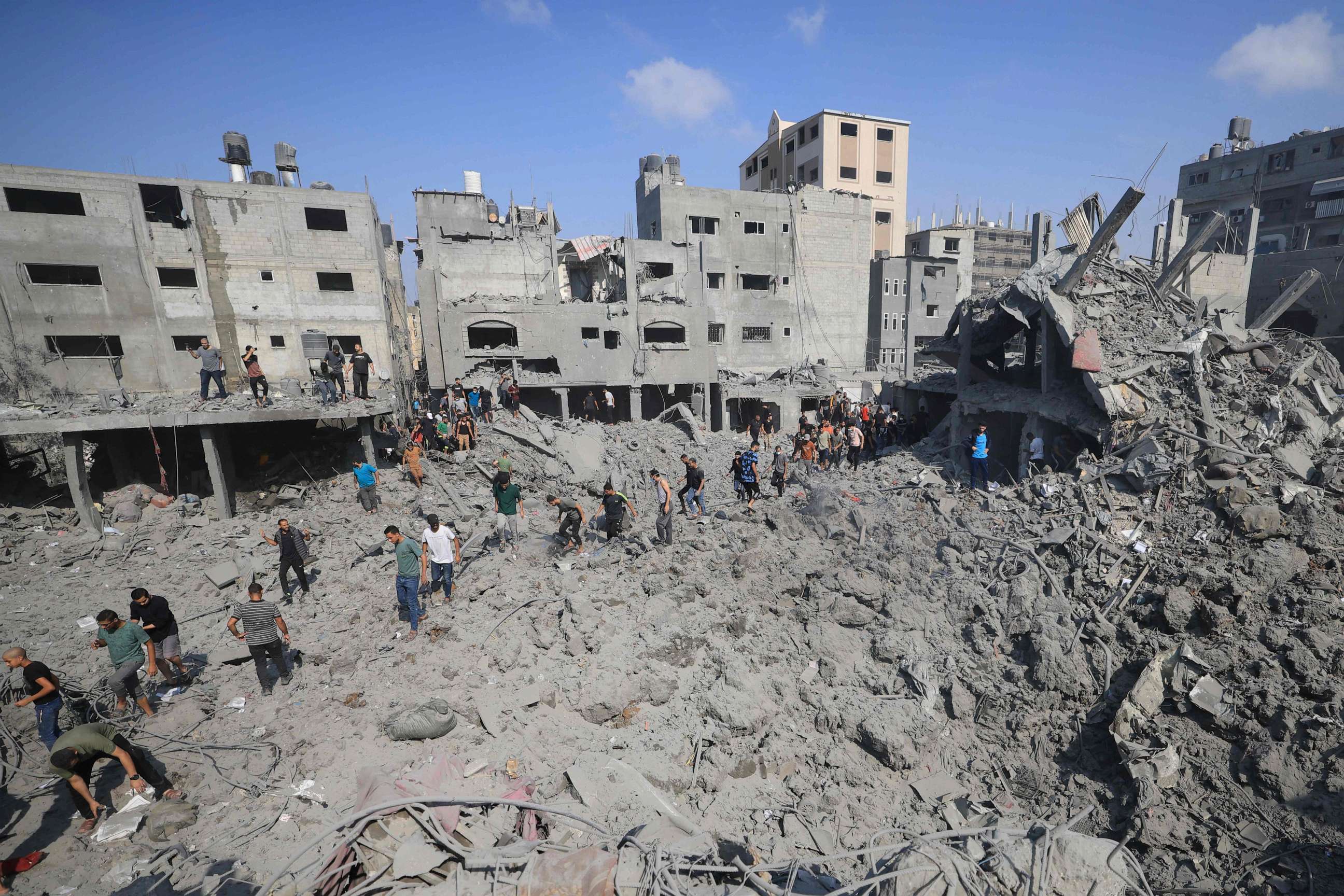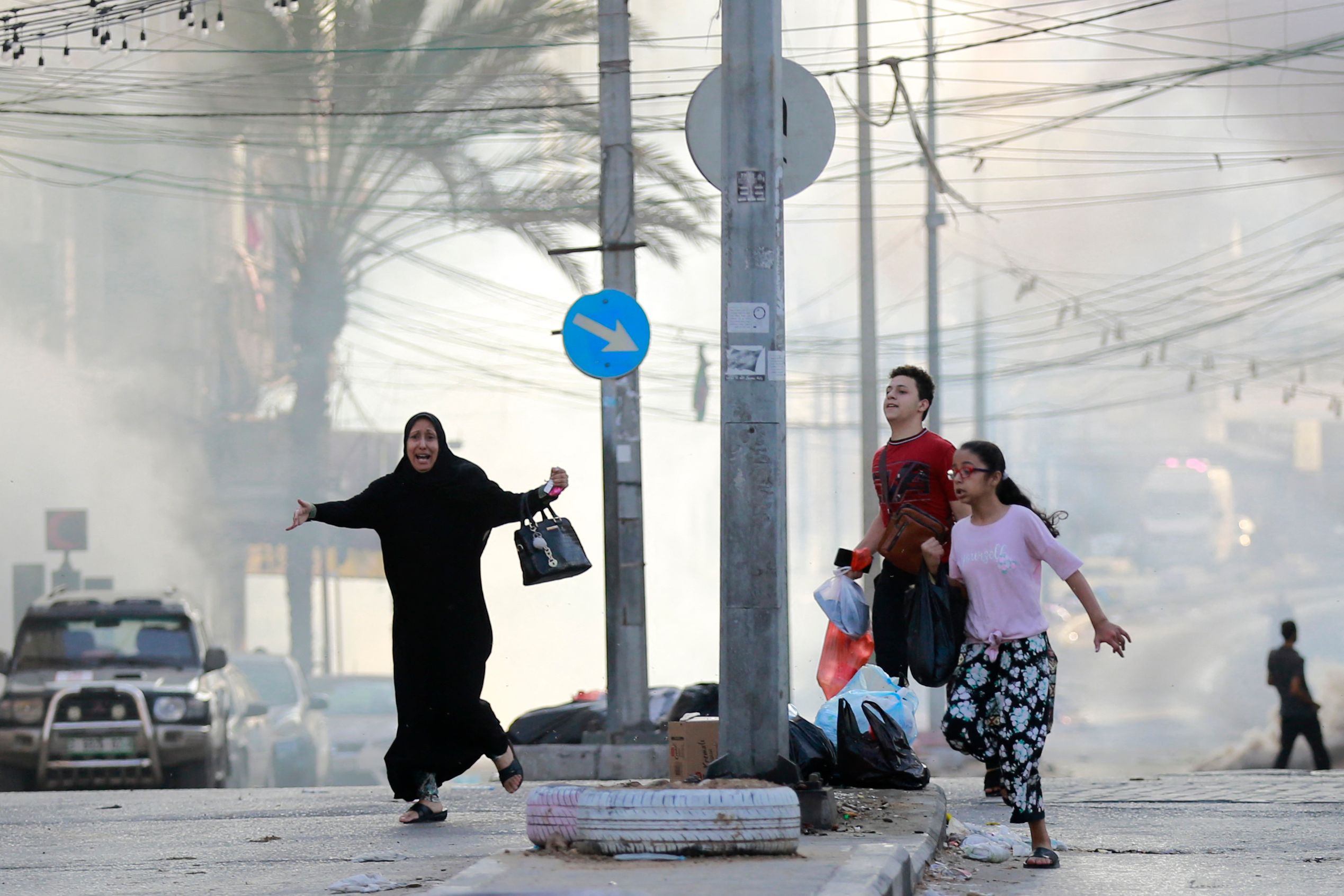People in Gaza share what life is like amid bombardment of Israel-Hamas war: 'We're all humans'
"No one should have to live in this type of situation. It's just evil."
SDEROT, Israel -- An Israeli fighter jet roared overhead as it dropped a bomb near where Lena Beseiso and her family were hunkered down in the war-torn Gaza Strip.
The 57-year-old Palestinian-American citizen, who has been trapped there for weeks, is now no stranger to the sound of explosions, but the thunderous bang still startled her.
"Right now, the skies above are full of F-16s," Beseiso told ABC News in a series of audio messages on Monday. "It's truly frightening. This is 24/7 and it gets intense at times. They get more vicious."
Beseiso, a Utah resident, said she hadn't been back to Gaza in 12 years when she traveled there in late March with her husband, two of her daughters and a 10-year-old grandson to visit relatives. While there, one of her daughter's passports expired and she said they were unable to obtain a renewal from the U.S. Embassy in Jerusalem before Gaza's militant rulers, Hamas, launched a terror attack on neighboring Israel on Oct. 7.
"We've been abandoned," she added. "My country should be getting us back home safely. What is everyone waiting for? For us to be another number, another name?"
When asked for comment about Beseiso's situation, a U.S. Embassy spokesperson told ABC News on Wednesday: "Due to privacy considerations, we are not able to comment on specific cases, but we have made thousands of phone calls and sent thousands of emails to U.S. citizens in Gaza, their immediate family members, and their loved ones who are inquiring with us on their behalf."
Beseiso was on Thursday among the hundreds of Americans who would be allowed to enter Egypt through the border crossing in the south, according to a list released by Egyptian authorities.
It's the latest outbreak of war between Israel and Hamas. The Palestinian militant group, which the United States has designated a terrorist organization, carried out an unprecedented incursion from Gaza into neighboring southern Israel by air, land and sea on Oct. 7, killing over 1,400 people and taking more than 200 others hostage, according to the Israel Defense Forces (IDF).
In response to the attack, the Israeli military has carried out wide-scale airstrikes on Gaza, killing more than 9,000 and destroying thousands of homes, according to the Hamas-run Ministry of Health. In recent days, the Israeli military has also sent ground troops into Gaza while gradually expanding its operations there. Unlike Israel, Gaza has no air raid sirens or bomb shelters.

Gaza, a 140-square-mile territory, is home to more than 2 million Palestinians who have lived under a blockade imposed by Israel and supported by Egypt since Hamas seized power in 2007. Human rights organizations have long described the densely populated strip as the world's largest open-air prison, due to Israel's generalized ban on travel for Gaza residents as well as Egypt's restrictive policies at its shared border.
Beseiso said she and her family have been sheltering in southern Gaza for weeks after heeding warnings from the Israeli military to evacuate the north. The part of the 140-square-mile territory that shares a border with Egypt is in the south. But, like so many others, they have been unable to leave Gaza and enter neighboring Egypt through the Rafah border crossing in the south.
"I swear, Hamas is not the one that's not allowing us to leave. They don't even care," Beseiso told ABC News. "We went to the border four times and we were able to travel, but we couldn't go through because Egypt had closed the gate and kept it closed. And as we would be there, Rafah crossing would get bombed by the IDF."
"There are no Hamas or Palestinian officials there," she added. "I have not seen one gunman in the streets or even at the border."
However, U.S. Secretary of State Antony Blinken has cited Hamas as the only hurdle blocking the exit of foreign nationals from Gaza.
"The impediment is simple: It's Hamas," Blinken said during a Senate hearing on Tuesday. "We've not yet found a way to get them out by whatever -- through whatever place and by whatever means that Hamas is not blocking, but we're working that with intermediaries."
The Rafah crossing opened on Wednesday, allowing some foreign nationals and injured Gaza residents to exit the enclave for the first time since Oct. 7.
When asked about bombing southern Gaza, where people had been told to move, the IDF has said it is making efforts to minimize civilian casualties and that its airstrikes are precise and aimed at Hamas targets.
It's the nighttime that is most "fearful" for Beseiso because she said they "don't know what's going on." Gaza relies on Israel and fuel imports for its power and, since Oct. 7, Israel has cut off electricity and fuel supplies to the Hamas-run enclave. Much of Gaza is currently without power or internet and the Hamas-controlled Ministry of Health has said that fuel is running dangerously low. Israeli authorities, however, have accused Hamas of stockpiling fuel and have so far prevented humanitarian organizations from delivering more.
"No one should have to live in this type of situation. It's just evil," Beseiso told ABC News. "We're all humans. No one should have to live in fear."

Omar Alnajjar, a 26-year-old Palestinian who lives in Gaza, said telephone and internet connections were completely cut on Friday night. The communications blackout lasted for about 48 hours, according to Ainajjar, who works as a project manager for Save Youth Future Society, an independent nonprofit investing in creating opportunities for Palestinian youth in Gaza.
He said his house has some solar energy that allowed him to at least charge his phone and he used a radio to listen to the news, but he said the signal was interrupted by Israeli military drones.
"All we wanted to hear and we seek to hear during these 48 hours on the radio is a cease-fire," Alnajjar told ABC News in a video message on Tuesday. "But nothing happened."
"The only thing [that has] changed is the intensity and the crazy bombing," he added.
Abood Okal, a 36-year-old Palestinian-American citizen and Massachusetts resident, was also visiting family in Gaza with his wife and 1-year-old when the war began. They have been stranded there ever since.
"We've run out of drinking water yesterday," Okal told ABC News in an audio message on Monday. "A desalination station that's nearby, that we've been relying on has run out of fuel to run the generators."
He said he and his family "roamed the main roads and streets" of the city of Rafah in southern Gaza, where they have been staying, to look for trucks or horse-drawn carts carrying tanks filled with drinking water taken from one of the very few desalination stations that are still operational there.
"We stood in line; I think it was for maybe about two hours to fill one gallon," he said. "We're hoping that would last us for the rest of the day today and for most of tomorrow until we could find another place to get drinking water from."
As of Wednesday, less than 300 trucks carrying humanitarian aid, such as food and medical supplies, have been allowed to enter Gaza via the Rafah border crossing since Oct. 7 -- a fraction of the quantity needed, according to the Egyptian and Palestinian Red Crescent societies.
Okal said he has noticed "an increase in artillery shelling" near the eastern side of Rafah where they are sheltering in a house with dozens of others.
"Every once in a while, we would hear heavy caliber gunfire that we believe is fired from tanks," he added. "Our biggest fear now is that the ground invasion is imminent near the neighborhoods where we are."
ABC News' Camilla Alcini, Shannon Crawford and Somayeh Malekian contributed to this report.




